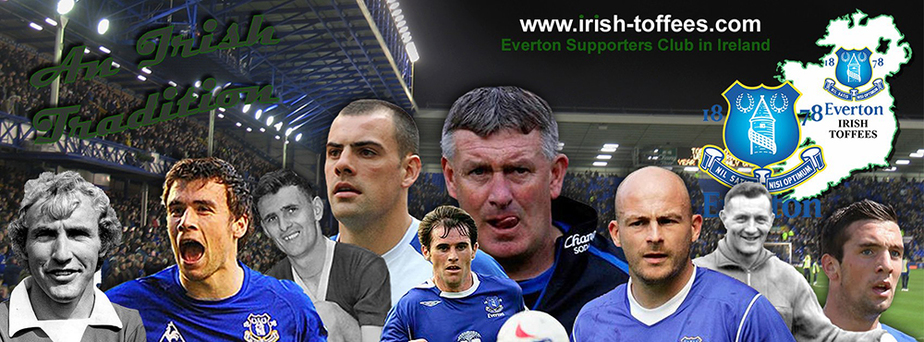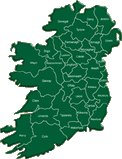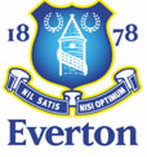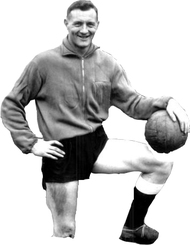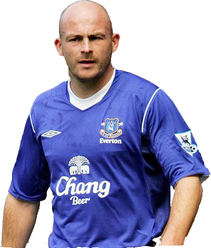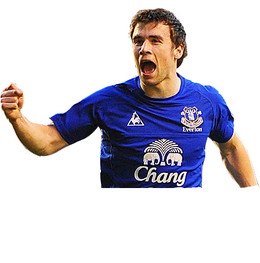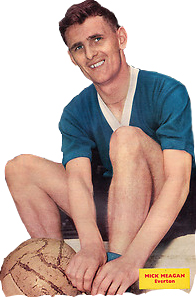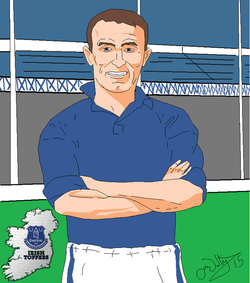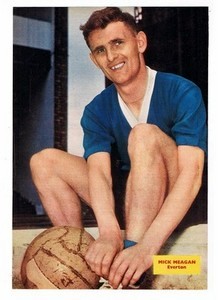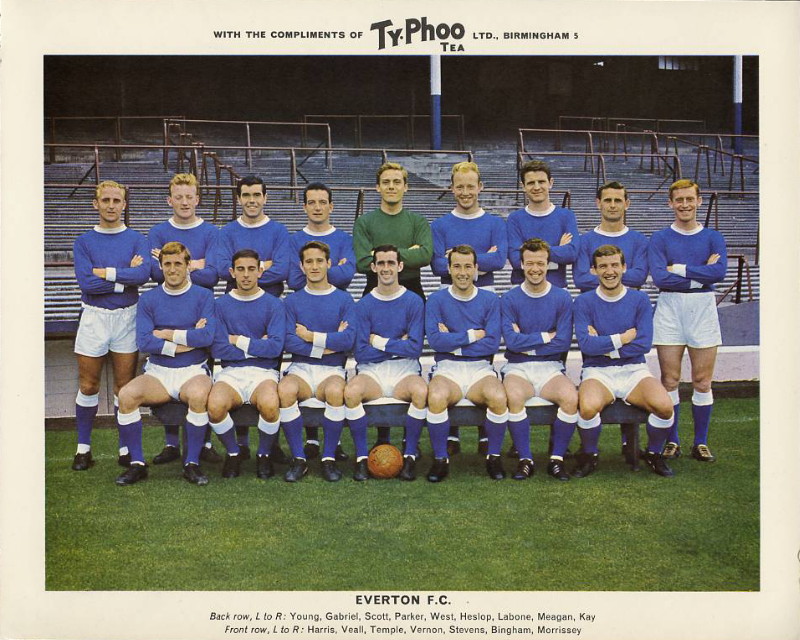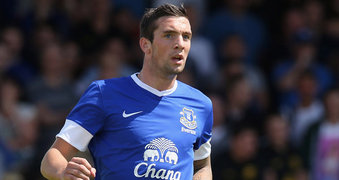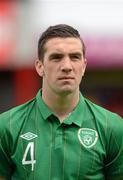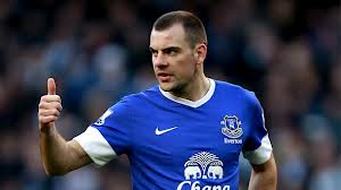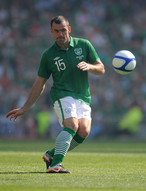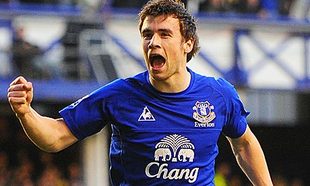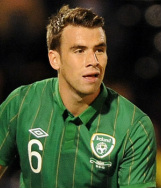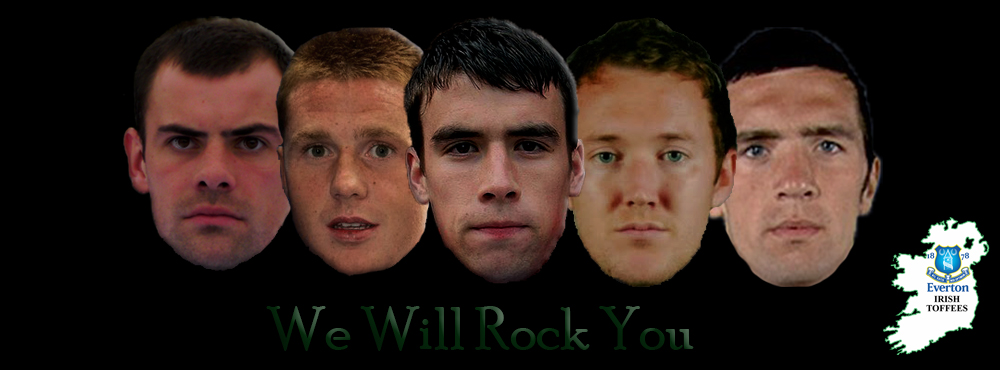Everton - An Irish Tradition
Everton and Ireland have shared a special relationship down through the years. It is often forgotten that Everton have had more Irish players than any other team. The aim of this page is to provide an archive of details on this exclusive group of players. Please enter our poll below to find the most liked Everton / Ireland players. Please feel free to pass on any pictures or stories/ information on any of these players to [email protected], especially if it's not readily available on the internet.
Gareth Farrelly
by Ciaran McNulty
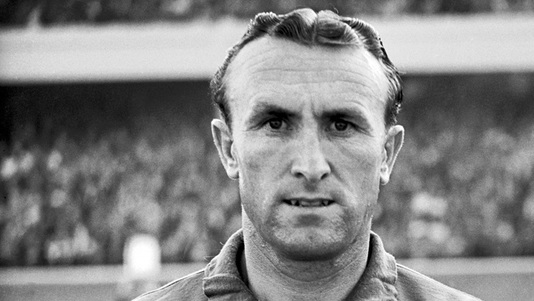
At football’s top level, the era of the working class hero is over. Sure, Steven Naismith’s giving a pretty good account of himself, dispensing tickets to folks who’d otherwise struggle to afford them, but generally speaking, you must go a long way down from soccer’s top tiers to find men who net goals for your club one day and then meet you in the street with a wave the next.
So different was the nature of the era in which Tommy Eglington played that, in his retirement from the game, the people of Clontarf could go and buy some brisket from a footballing legend- a working class hero with blood on his apron and goals in his past.
It’s his sheer accessability to the general public that sees me set out to write this with some trepidation, knowing full well that my usual round of internet research might be put to shame by the good folks on Facebook who actually knew him or who are related to him!
That said, Tommy was born in Donnycarney, taking his first steps towards the professional game with the likes of Munster Victoria before attracting the attention of Shamrock Rovers. Proving an integral left winger for that Rovers side, he helped them win 2 FAI Cups, but we won’t hold that against him.
It was treading the Milltown turf that Tommy was first teamed with a certain Peter Farrell, whom it’s impossible not to mention when discussing Tommy’s career. The two almost seemed to come as a package deal wherever they went, and it was in 1946 that their pairing fetched £10,000 from a team in Blue from across the water.
There’s something characteristically Evertonian about the mixed bag of the“Irish Era” of the 1940s and 50s at Goodison Park. World War II’s very rude interruption had upset us when we were top of the pyramid and we returned post-war to struggle up and down the top flight before ultimately secumbing to relegation for the 2nd time.
And yet this was our time- the Irish had decidedly taken over Goodison Road!
And so it was that Tommy Eglinton’s best years were given to the Second Division. Who knows how many more people around the world would know his name had he and his fellow Irish Toffees been plying their trade in the top tier? Instead, it was the next rung down that he took by storm. His goal tally was quite simply imperious as, in many ways, he proved himself to the 50s answer to Dixie Dean, his First Division quality skills blowing away overwhelmed and under-qualified opposition.
Just ask Doncaster Rovers how they felt about this Irishman who rocked up one day and put five past them. In addition to his impressive goal tally in the Second Division, Tommy also earned himself the distinction of having made more appearances for the blues in the second flight than any other player. No mean feat, considering the mere 4 seasons we’ve speant outside the top flight in all our history.
In a time when international declarations for Irish footballers were even more complicated than they are today, Tommy was one of those many players (along with, you guessed it, Peter Farrell) who represented both national sides from North and South of the border. One can imagine that the confusing climate of having 2 teams both claiming to be the all-Ireland representation of football side could result in a certain mercenary reaction from players but bare in mind how difficult it must’ve been for the players back then, making very little as pro-footballers and with both national sides knocking at your door.
As it happens, the southern FAI side eventually saw more of Tommy but sadly he wasn't involved in the game where Ireland became the first foreign nation to beat England on their home soil in 1949.
Finishing up at the Grand Old Lady with 80+ goals, Eglington moved on Tranmere Rovers and, as they were apparently joined at the hip, so did Farrell.
Tommy wound up his footballing career at the now defunct Cork Hibernian and then of course the famous butcher’s came along.
It’s such a testimont to the man’s popularity and place in the community, that I’ve seen a good number of photos posted by fans around the web of them posing with him in his Clontarf butcher’s shop. During those years, as he carved up meat for the locals, he retained the record of being the last Everton player to score the winner at Elland Road in the league. Leeds’ commanding form in the 70s and Everton’s lack of it in the 90s both contributed to the record standing until some jug-eared fat kid finally got us another winner there in 2002. 2 years before his death, and still a blue, I doubt Tommy minded.
He left us in 2004, aged 81.
In 2011, the FAI unveiled a commemorative display to Tommy at their headquarters. It seems that the FAI only commission a statuette for players with 25 caps and with 24, Tommy wasn’t supposed to qualify…but he got one anyway. What better tribute is there, really? The FAI. The IFA. Both always willing to bend the rules so they could include this working class hero.
So different was the nature of the era in which Tommy Eglington played that, in his retirement from the game, the people of Clontarf could go and buy some brisket from a footballing legend- a working class hero with blood on his apron and goals in his past.
It’s his sheer accessability to the general public that sees me set out to write this with some trepidation, knowing full well that my usual round of internet research might be put to shame by the good folks on Facebook who actually knew him or who are related to him!
That said, Tommy was born in Donnycarney, taking his first steps towards the professional game with the likes of Munster Victoria before attracting the attention of Shamrock Rovers. Proving an integral left winger for that Rovers side, he helped them win 2 FAI Cups, but we won’t hold that against him.
It was treading the Milltown turf that Tommy was first teamed with a certain Peter Farrell, whom it’s impossible not to mention when discussing Tommy’s career. The two almost seemed to come as a package deal wherever they went, and it was in 1946 that their pairing fetched £10,000 from a team in Blue from across the water.
There’s something characteristically Evertonian about the mixed bag of the“Irish Era” of the 1940s and 50s at Goodison Park. World War II’s very rude interruption had upset us when we were top of the pyramid and we returned post-war to struggle up and down the top flight before ultimately secumbing to relegation for the 2nd time.
And yet this was our time- the Irish had decidedly taken over Goodison Road!
And so it was that Tommy Eglinton’s best years were given to the Second Division. Who knows how many more people around the world would know his name had he and his fellow Irish Toffees been plying their trade in the top tier? Instead, it was the next rung down that he took by storm. His goal tally was quite simply imperious as, in many ways, he proved himself to the 50s answer to Dixie Dean, his First Division quality skills blowing away overwhelmed and under-qualified opposition.
Just ask Doncaster Rovers how they felt about this Irishman who rocked up one day and put five past them. In addition to his impressive goal tally in the Second Division, Tommy also earned himself the distinction of having made more appearances for the blues in the second flight than any other player. No mean feat, considering the mere 4 seasons we’ve speant outside the top flight in all our history.
In a time when international declarations for Irish footballers were even more complicated than they are today, Tommy was one of those many players (along with, you guessed it, Peter Farrell) who represented both national sides from North and South of the border. One can imagine that the confusing climate of having 2 teams both claiming to be the all-Ireland representation of football side could result in a certain mercenary reaction from players but bare in mind how difficult it must’ve been for the players back then, making very little as pro-footballers and with both national sides knocking at your door.
As it happens, the southern FAI side eventually saw more of Tommy but sadly he wasn't involved in the game where Ireland became the first foreign nation to beat England on their home soil in 1949.
Finishing up at the Grand Old Lady with 80+ goals, Eglington moved on Tranmere Rovers and, as they were apparently joined at the hip, so did Farrell.
Tommy wound up his footballing career at the now defunct Cork Hibernian and then of course the famous butcher’s came along.
It’s such a testimont to the man’s popularity and place in the community, that I’ve seen a good number of photos posted by fans around the web of them posing with him in his Clontarf butcher’s shop. During those years, as he carved up meat for the locals, he retained the record of being the last Everton player to score the winner at Elland Road in the league. Leeds’ commanding form in the 70s and Everton’s lack of it in the 90s both contributed to the record standing until some jug-eared fat kid finally got us another winner there in 2002. 2 years before his death, and still a blue, I doubt Tommy minded.
He left us in 2004, aged 81.
In 2011, the FAI unveiled a commemorative display to Tommy at their headquarters. It seems that the FAI only commission a statuette for players with 25 caps and with 24, Tommy wasn’t supposed to qualify…but he got one anyway. What better tribute is there, really? The FAI. The IFA. Both always willing to bend the rules so they could include this working class hero.
Mick Meagan
|
by Ciaran McNulty
It says a lot if a guy who played for and managed both Drogheda and Shamrock Rovers is still held in high esteem by a Dundalk man. But yes, despite these transgressions, I do love Mick Meagan. How could I not?
What Evertonian couldn’t love a guy who can say that he played under Everton’s 2nd ever manager, was one of the last ever Toffees to play for us outside the top flight(and then back up into it) and who, as recently as last season, put 50 quid on us to win the league!
Playing amongst names like Farrell and Eglington as an Everton youngster, Meagan was part of that era when Everton were the Irish team. There was an Irish contingent in the club’s ranks so strong and an immigrant community on Merseyside so vast, that here in Ireland, being Irish and being Blue seemed one and the same. Before the dark times, of course, when Irish fans became characteristically fickle and fair-weather in their footballing allegiances.
Playing in many positions, under 4 different Everton managers, Mick donned the blue jersey for 12 years and made 165 appearances, whilst in the latter part of that Everton career becoming one of the early shining lights(or workhorses, at least) of the still fairly low key Irish international set-up.
Mick is often heard in interviews speaking of his experience commuting back and forth between Liverpool and Dublin as he balanced Everton and Ireland duties, and claims it didn’t feel like travel at all, such was the similar flavour and feel of the two cities.
Nowadays, a young man of 80, Mick Meagan gets up and swims everyday and plays head tennis every Saturday at the Forty Foot in Sandycove. So, you can actually head down on a Saturday and see the great man do his thing, keeping his mind and body fit.
To see just how sharp his mind is, check out this great interview below, in which he gives what can only be described as an insanely optimistic appraisal of Euro 2012, talks about getting “hidin’s” for playing football and even demonstrates some of those head tennis skills.
The uncontainable Mick Meagan, ladies and gentlemen….
What Evertonian couldn’t love a guy who can say that he played under Everton’s 2nd ever manager, was one of the last ever Toffees to play for us outside the top flight(and then back up into it) and who, as recently as last season, put 50 quid on us to win the league!
Playing amongst names like Farrell and Eglington as an Everton youngster, Meagan was part of that era when Everton were the Irish team. There was an Irish contingent in the club’s ranks so strong and an immigrant community on Merseyside so vast, that here in Ireland, being Irish and being Blue seemed one and the same. Before the dark times, of course, when Irish fans became characteristically fickle and fair-weather in their footballing allegiances.
Playing in many positions, under 4 different Everton managers, Mick donned the blue jersey for 12 years and made 165 appearances, whilst in the latter part of that Everton career becoming one of the early shining lights(or workhorses, at least) of the still fairly low key Irish international set-up.
Mick is often heard in interviews speaking of his experience commuting back and forth between Liverpool and Dublin as he balanced Everton and Ireland duties, and claims it didn’t feel like travel at all, such was the similar flavour and feel of the two cities.
Nowadays, a young man of 80, Mick Meagan gets up and swims everyday and plays head tennis every Saturday at the Forty Foot in Sandycove. So, you can actually head down on a Saturday and see the great man do his thing, keeping his mind and body fit.
To see just how sharp his mind is, check out this great interview below, in which he gives what can only be described as an insanely optimistic appraisal of Euro 2012, talks about getting “hidin’s” for playing football and even demonstrates some of those head tennis skills.
The uncontainable Mick Meagan, ladies and gentlemen….
Shane Duffy (from wikipedia)
|
Full name Shane Patrick Michael Duffy
Date of birth 1 January 1992 Place of birth Derry, Northern Ireland Height 1.93 m (6 ft 4 in) Playing position Centre back Current club Blackburn Number 34 2008–2009 Foyle Harps 2009- 2014 Everton 2014- Blackburn |
Shane Patrick Michael Duffy (born 1 January 1992) is an Irish footballer. Duffy plays for English club Everton. He has chosen to represent Republic of Ireland at senior international level despite having represented Northern Ireland at junior level. This decision was a catalyst in the IFA's decision to take a case to the Court of Arbitration for Sport to prevent players switching allegiance from Northern Ireland to the Republic of Ireland. The case failed, with the court ruling that as Northern Ireland-born people are entitled to Irish citizenship by birth, are entitled to play for either the Republic or Northern Ireland.
As a youth, Duffy played Gaelic football for Doire Colmcille CLG and association football for Foyle Harps, both based in Derry. He represented Northern Ireland at under 16 level in the 2007 Victory Shield tournament and impressed Everton manager David Moyes in a performance at Bloomfield Road against England.
Duffy joined Everton in November 2008 as a first-year scholar and worked his way through the U-18[3] and reserve teams. Manager David Moyes named him and several young players in the first team for the pre-season friendlies and Duffy scored his first Everton goal against Rochdale in a 4–0 victory. He made his professional debut versus AEK Athens in the UEFA Europa League in December 2009, coming on for the injured Sylvain Distin. In Everton's next European fixture, Duffy made his home debut at Goodison Park, completing the full 90 minutes against BATE Borisov.
Duffy joined Burnley on loan on 24 March 2011 on an initial 28-day loan with the possibility of an extension until the end of the 2010–11 season.[6] Duffy made his debut for Burnley on 2 April 2011 in the 2–1 defeat to Ipswich Town, playing the full 90 minutes.
Duffy joined Scunthorpe on loan on 1 September 2011. He made his debut on 10 September against Sheffield United, winning the Man of the Match award. He made a total of 19 appearances for the Iron before his parent club recalled him on 5 January 2012, due to an injury to Phil Jagielka, Everton's regular centre-back.
Duffy made his Premier League debut at White Hart Lane on 11 January 2012, coming on as a substitute for the final 30 minutes in a 2–0 defeat to Tottenham Hotspur. With Everton's regular centre-backs, Sylvain Distin and Phil Jagielka, injured for the next game three days later, Duffy made the first Premier League start of his career in a 1–1 draw with Aston Villa.
Duffy was part of the Northern Ireland youth set-up from the U16 level upward. An U17 regular, he was in the squad for their unsuccessful 2009 European Championship qualifying campaign and scored the only goal of the match, a penalty, in the opening game against Liechtenstein.
Aged 17, he was called up to the senior team in June 2009 for a friendly against Italy but was an unused substitute. In August 2009, he made his Northern Ireland U21 début, playing the whole match and scoring in the 2–1 away loss to Portugal.
Duffy played several games in the 2010 UEFA Under-19 Championship qualifiers, scoring twice in a 4–0 victory over Bosnia-Herzegovina, Northern Ireland's first win of the qualifying campaign.
Despite being born in Northern Ireland, Duffy is eligible to play for the Republic of Ireland due to both his birth-right to Irish nationality and through his Donegal-born father and maternal grandparents and opted to play for Republic of Ireland, Following a discussion with former international Liam Brady, Duffy was called up to the Republic of Ireland training camp in May 2010. Everton formally informed the IFA of Duffy's change in allegiance,and the player was called up for a training camp squad for the Republic of Ireland squad to take place in May 2010. At the camp Duffy suffered a 'freak' injury, during a match between the Republic of Ireland development squad and the Ireland amateur side, when he collided with goalkeeper Adrian Walsh and had to undergo life saving surgery at the Mater Hospital after damaging his liver and was discharged six days later after making a full recovery. Although it was expected to take a number of months for him to recuperate and regain his fitness, Duffy returned to action in little over ten weeks after his injury and has since appeared for Republic of Ireland under-19 and under-21 squads. He was called up for the U21 friendly versus Portugal in March 2011.
Players such as Duffy, Daniel Kearns, Darron Gibson and Marc Wilson had represented Northern Ireland at youth level but later opted to play for Republic of Ireland. The IFA disputed the players' right to do so under FIFA rules[20] and felt the current rules were a "clear disadvantage over all other 206 Associations".
The Irish Football Association took a case to the Court of Arbitration for Sport with the hope of getting FIFA to 'uphold' the rules. Although Duffy's name is often linked with this dispute and the IFA appeal to the Court of Arbitration for Sport, his situation differs from that of players such as Darron Gibson because of his close family ties to Donegal. This means he would have been eligible to play for the Republic of Ireland wherever he was born. On 13 February 2012, less than two years after sustaining a life-threatening injury, Duffy received a call up to the Republic of Ireland senior squad, replacing the injured Richard Dunne. On 1 November 2012, Duffy was named in the provisional 26-man Republic of Ireland squad for the friendly fixture against Greece on 14 November 2012.
As a youth, Duffy played Gaelic football for Doire Colmcille CLG and association football for Foyle Harps, both based in Derry. He represented Northern Ireland at under 16 level in the 2007 Victory Shield tournament and impressed Everton manager David Moyes in a performance at Bloomfield Road against England.
Duffy joined Everton in November 2008 as a first-year scholar and worked his way through the U-18[3] and reserve teams. Manager David Moyes named him and several young players in the first team for the pre-season friendlies and Duffy scored his first Everton goal against Rochdale in a 4–0 victory. He made his professional debut versus AEK Athens in the UEFA Europa League in December 2009, coming on for the injured Sylvain Distin. In Everton's next European fixture, Duffy made his home debut at Goodison Park, completing the full 90 minutes against BATE Borisov.
Duffy joined Burnley on loan on 24 March 2011 on an initial 28-day loan with the possibility of an extension until the end of the 2010–11 season.[6] Duffy made his debut for Burnley on 2 April 2011 in the 2–1 defeat to Ipswich Town, playing the full 90 minutes.
Duffy joined Scunthorpe on loan on 1 September 2011. He made his debut on 10 September against Sheffield United, winning the Man of the Match award. He made a total of 19 appearances for the Iron before his parent club recalled him on 5 January 2012, due to an injury to Phil Jagielka, Everton's regular centre-back.
Duffy made his Premier League debut at White Hart Lane on 11 January 2012, coming on as a substitute for the final 30 minutes in a 2–0 defeat to Tottenham Hotspur. With Everton's regular centre-backs, Sylvain Distin and Phil Jagielka, injured for the next game three days later, Duffy made the first Premier League start of his career in a 1–1 draw with Aston Villa.
Duffy was part of the Northern Ireland youth set-up from the U16 level upward. An U17 regular, he was in the squad for their unsuccessful 2009 European Championship qualifying campaign and scored the only goal of the match, a penalty, in the opening game against Liechtenstein.
Aged 17, he was called up to the senior team in June 2009 for a friendly against Italy but was an unused substitute. In August 2009, he made his Northern Ireland U21 début, playing the whole match and scoring in the 2–1 away loss to Portugal.
Duffy played several games in the 2010 UEFA Under-19 Championship qualifiers, scoring twice in a 4–0 victory over Bosnia-Herzegovina, Northern Ireland's first win of the qualifying campaign.
Despite being born in Northern Ireland, Duffy is eligible to play for the Republic of Ireland due to both his birth-right to Irish nationality and through his Donegal-born father and maternal grandparents and opted to play for Republic of Ireland, Following a discussion with former international Liam Brady, Duffy was called up to the Republic of Ireland training camp in May 2010. Everton formally informed the IFA of Duffy's change in allegiance,and the player was called up for a training camp squad for the Republic of Ireland squad to take place in May 2010. At the camp Duffy suffered a 'freak' injury, during a match between the Republic of Ireland development squad and the Ireland amateur side, when he collided with goalkeeper Adrian Walsh and had to undergo life saving surgery at the Mater Hospital after damaging his liver and was discharged six days later after making a full recovery. Although it was expected to take a number of months for him to recuperate and regain his fitness, Duffy returned to action in little over ten weeks after his injury and has since appeared for Republic of Ireland under-19 and under-21 squads. He was called up for the U21 friendly versus Portugal in March 2011.
Players such as Duffy, Daniel Kearns, Darron Gibson and Marc Wilson had represented Northern Ireland at youth level but later opted to play for Republic of Ireland. The IFA disputed the players' right to do so under FIFA rules[20] and felt the current rules were a "clear disadvantage over all other 206 Associations".
The Irish Football Association took a case to the Court of Arbitration for Sport with the hope of getting FIFA to 'uphold' the rules. Although Duffy's name is often linked with this dispute and the IFA appeal to the Court of Arbitration for Sport, his situation differs from that of players such as Darron Gibson because of his close family ties to Donegal. This means he would have been eligible to play for the Republic of Ireland wherever he was born. On 13 February 2012, less than two years after sustaining a life-threatening injury, Duffy received a call up to the Republic of Ireland senior squad, replacing the injured Richard Dunne. On 1 November 2012, Duffy was named in the provisional 26-man Republic of Ireland squad for the friendly fixture against Greece on 14 November 2012.
Darron Gibson (from wikipedia)
|
Full name Darron Thomas Daniel Gibson
Date of birth 25 October 1987 Place of birth Derry, Northern Ireland Height 1.83 m (6 ft 0 in) Playing position Midfielder Current club Everton Number 4 2004–2012 Manchester United 2012– Everton National team 2006 Republic of Ireland U21 2006 Republic of Ireland B 2007 Republic of Ireland |
A former pupil of St Columb's College, Gibson played junior football in the Derry and District League, and then with Institute before joining Manchester United in 2004.[9] He made his senior debut for United on 26 October 2005 in a League Cup game against Barnet, coming on as a substitute for Lee Martin. During the 2005–06 season he played regularly for Manchester United Reserves, helping them win a treble. He made 19 appearances, scoring twice. In May 2006, he won the prestigious Jimmy Murphy Award as United's youth player of the year and then played regularly for the United senior team during their pre-season summer games, together with Dong Fangzhuo, Jonny Evans, Fraizer Campbell and Danny Simpson.
Gibson made his Premier League debut on 15 November 2008, appearing as a second half substitute against Stoke City, before making his UEFA Champions League debut ten days later, coming on as a substitute for Darren Fletcher against Villarreal on 25 November 2008. In December 2008, he travelled with the United squad to the 2008 FIFA Club World Cup in Japan, where, despite not making any appearances, he picked up a winners' medal. On 4 January 2009, Gibson scored his first goal for the club, United's third in a 3–0 victory over Southampton in the FA Cup third round. On 1 March 2009, Gibson started in the centre of midfield alongside Paul Scholes against Tottenham Hotspur in the 2009 Football League Cup Final at Wembley Stadium, playing the full initial 90 minutes before being replaced by Ryan Giggs at the start of extra time as Manchester United went on to win 4–1 on penalties.[11] On 24 May, he scored his first league goal for Manchester United in the last game of the 2008–09 Premier League season against Hull City.[12] Gibson was rewarded with a three-year extension to his Manchester United contract, tying him to the club until at least 2012.
Gibson was one of a number of young United players who came under some fire when they lost a four-year unbeaten home record in Europe, losing 1–0 to Beşiktaş at Old Trafford. On 1 December 2009, six days on from the defeat in the Champions League, Gibson responded to the criticism by scoring both of United's goals in a 2–0 win against Tottenham to send United through the semi-finals of the League Cup. Gibson was granted a starting place in the Champions League second leg quarter-final tie against Bayern Munich and scored a long-range shot after only three minutes, his first goal in a UEFA competition, but despite winning the game 3–2, they were knocked out by Bayern on away goals with the aggregate score ending 4–4.
He scored his first goal of the 2010–11 season as he netted the first of United's goals in a 5–2 away win over Scunthorpe United in the League Cup. In February 2011, Gibson's national team manager, Giovanni Trapattoni, told him that he must leave Manchester United in order to further his career. Sunderland agreed a transfer fee with United to sign Gibson in the summer of 2011, but Gibson could not agree personal terms. He subsequently only made two appearances for the club in the 2011–12 season, despite there being a number of midfielders out injured at Old Trafford, and left the club in January 2012.
Gibson was one of several United players who spent the 2006–07 season on loan at Royal Antwerp. In October 2007, he was loaned out again, this time to Wolverhampton Wanderers, where he spent the majority of the 2007–08 season. At Wolves he scored once, against Burnley on 8 December 2007.
On 13 January 2012, Gibson signed for Everton for an undisclosed fee. He became the fourth ex-United player to sign for Everton under David Moyes, following Phil Neville, Tim Howard and Louis Saha. He made his debut a day later, as he started in a 1–1 draw with Aston Villa. Later that month, Gibson scored his first goal for the club in a 1–0 home win against league leaders Manchester City. Gibson played 11 times in the league during his first season with the club and didn't finish on the losing side once. If his time at Manchester United is taken into account this figure is stretched to 28 consecutive league games without defeat. The run came to an end in Everton's third league game of the 2012–13 season, when Gibson started in a 0–2 loss to West Bromwich Albion, although the game was level at 0–0 when Gibson was substituted in the first half due to injury. Gibson was sent off for the first time in his career, in a 1–2 win away to West Ham United on 22 December 2012, although the red card and subsequent ban were rescinded by the The Football Association five days later. On 13 April 2013, Gibson scored his first goal of the season in a 2–0 home win against Queens Park Rangers. His impact on Everton in his first two seasons was such that the club won 52% of the games he played in and only 25% of those he did not, with Gibson being hailed as the key link between attack and defence.
Gibson was at the centre of a dispute between the Irish Football Association (IFA) and the Football Association of Ireland (FAI) over the eligibility of players born within Northern Ireland to represent the Republic of Ireland. The general principle or article 5 of FIFA's Regulations Governing the Application of the Statutes states that "any person holding a permanent nationality that is not dependent on residence in a certain country is eligible to play for the representative teams of the Association of that country". Due to the constitutional position of Northern Ireland, following the signing of the Good Friday Agreement, citizenship of the Republic of Ireland is the undisputed birthright of every person born on the island of Ireland if they so wish. As a result, Gibson was approached to represent both Northern Ireland and the Republic of Ireland at international level.
Gibson initially represented Northern Ireland at Under-16 level and was included in Victory Shield squads. However, he was dropped from the team after attending trials with Manchester United and subsequently switched allegiance to the Republic of Ireland.[36][37] Before Gibson made his senior international debut for the Republic of Ireland, Nigel Worthington, the Northern Ireland manager, made an unsuccessful attempt to persuade him to switch his allegiance back.
Gibson first represented the Republic of Ireland at under-17 level. Then during the 2005–06 season he captained both the Republic of Ireland under-19 and under-21 squads. On 14 November 2006, he also played for Republic of Ireland B in a 0–0 draw against Scotland B. In 2007, Gibson was included in several senior Republic of Ireland squads for Euro 2008 qualifiers, before he eventually made his debut in a 4–0 win against Denmark. During the away friendly, he came on as half-time substitute, replacing Andy Reid. In the 54th minute, Gibson fired a shot from outside the penalty area that the Danish keeper, Jesper Christiansen, could only palm away, allowing Shane Long to follow up and score the Republic's third goal. Gibson won his second full cap on 8 September 2007 in an away game against Slovakia. The Euro 2008 qualifier, which finished as a 2–2 draw, saw him again used as substitute, this time replacing Aiden McGeady after 61 minutes.
Gibson made his first start for the Republic of Ireland national team in a 1–0 win at home to Cyprus on 15 October 2008. After Steven Reid dropped out of the Irish squad due to injury, Gibson was called up to provide extra physicality in the centre of the Irish midfield. Manager Giovanni Trapattoni also cited Gibson's confidence on the football pitch as the reason for choosing him ahead of Liam Miller and Andy Reid.[44] On 8 February 2011, Gibson scored his first goal for his country, in a 3–0 victory over Wales in the first game of the 2011 Nations Cup. Gibson was selected in the Ireland squad for UEFA Euro 2012. However, he was an unused substitute for all of Ireland's matches as the team was knocked out in the group stage with three successive defeats. On 1 September 2012, Gibson was included in Ireland's squad to play Kazakhstan in a 2014 World Cup qualifier. However, he withdrew from the squad citing disappointment at his lack of playing time during Euro 2012. On 8 March 2013, he again turned down a call up for Ireland's World Cup qualifiers against Sweden and Austria.
Seamus Coleman (from wikipedia)
Séamus Coleman (born 11 October 1988) is an Irish footballer who plays for Everton and the Republic of Ireland. Originally a Gaelic footballer, Coleman started his association football career with Sligo Rovers before moving to English club Everton in 2009. In 2010 he spent half a season on loan with Blackpool, helping the team to win promotion via the 2010 Championship play-off, before returning to Everton. In his international career Coleman has won the 2011 Nations Cup and was awarded the FAI Under 21 International Player of the Year in both 2009 and 2010.
Originally a Gaelic footballer who, aged 16, played as a back on his local GAA team Na Cealla Beaga, Coleman was spotted by Sligo Rovers when he lined up for his hometown association football side, St. Catherine’s of Killybegs, in a friendly match against Sligo Rovers. He made his League of Ireland debut at the Brandywell in October 2006 as a substitute for Adam Hughes. He scored his only goal for Rovers against Bray Wanderers in May 2008.
Everton
Following recommendation by Willie McStay to former teammate and Everton manager David Moyes, Coleman was signed by the Merseyside club for £150,000 in January 2009, ahead of other interest from Ipswich Town, Birmingham City and Celtic. Before playing a game for Everton, Coleman had to undergo surgery on a career-threatening infected blister. He made his debut in the Europa League in a 5–0 loss to Benfica In his home debut, a Premier League match against Tottenham Hotspur, Coleman was named Man of the Match after coming on as a first half substitute for the injured Joseph Yobo and played an instrumental part for both of Everton's goals in a 2–2 draw. Coleman made his FA Cup debut against Carlisle United in January 2010 and created a goal for Tim Cahill after only a few minutes on the pitch. He scored his first goal for Everton against Brentford in the Football League Cup in 21 September 2010.
In March 2010, Coleman joined Blackpool on loan, initially for one month, making his debut in a 2–2 draw at home to Crystal Palace. He scored his first goal for the Tangerines in a 4–2 win away against Scunthorpe United. In April, Coleman's loan was extended until the end of the season. It was during this loan that Coleman agreed a new four-year contract with Everton, and he went on to play in Blackpool's play–off final, which they won 3–2 against Cardiff City.
Coleman returned to Everton for the following season, breaking into the first team on the right of midfield. He scored his first Premier League goal against his former team Blackpool in November 2010, signing a new four-and-a-half-year deal two months later, and was nominated for the 2011 PFA Young Player of the Year Award. He finished the season having scored four league goals, though was sent off for the first time in his career in the final game of the season, a 1–0 win against Chelsea. On 31 December 2012, Coleman signed a new five-and-a-half-year contract with Everton.
Coleman has represented Ireland U18 schools, he helped them retain the Centenary Shield in 2006. Coleman is an Ireland under 21 and U23 international, having made his debut for the former against Sweden in 2007. His most recent cap was as captain in a 1–0 defeat against Turkey in Izmir in November 2010. In August 2010, Coleman scored his only international goal to date at Tallaght Stadium. In the same month he won the 2009 FAI Under 21 Player of the Year Award. He retained the U21 award for 2010. He received his first call-up to the senior squad in October 2010, and made his full international début in the Republic of Ireland's inaugural Nations Cup match against Wales on 8 February 2011, which Ireland won 3–0. On 29 May 2013, Coleman was named Man of the Match for his performance against England at Wembley Stadium. He crossed the ball for Shane Long's opening goal of the game, a header past Joe Hart.
Coleman has two brothers; Francis and Stevie. His parents are Máire and Henry Coleman. As a boy he attended St. Catherine's Vocational School. He supports the Donegal senior football team. He also still follows his local GAA team, Na Cealla Beaga.
Originally a Gaelic footballer who, aged 16, played as a back on his local GAA team Na Cealla Beaga, Coleman was spotted by Sligo Rovers when he lined up for his hometown association football side, St. Catherine’s of Killybegs, in a friendly match against Sligo Rovers. He made his League of Ireland debut at the Brandywell in October 2006 as a substitute for Adam Hughes. He scored his only goal for Rovers against Bray Wanderers in May 2008.
Everton
Following recommendation by Willie McStay to former teammate and Everton manager David Moyes, Coleman was signed by the Merseyside club for £150,000 in January 2009, ahead of other interest from Ipswich Town, Birmingham City and Celtic. Before playing a game for Everton, Coleman had to undergo surgery on a career-threatening infected blister. He made his debut in the Europa League in a 5–0 loss to Benfica In his home debut, a Premier League match against Tottenham Hotspur, Coleman was named Man of the Match after coming on as a first half substitute for the injured Joseph Yobo and played an instrumental part for both of Everton's goals in a 2–2 draw. Coleman made his FA Cup debut against Carlisle United in January 2010 and created a goal for Tim Cahill after only a few minutes on the pitch. He scored his first goal for Everton against Brentford in the Football League Cup in 21 September 2010.
In March 2010, Coleman joined Blackpool on loan, initially for one month, making his debut in a 2–2 draw at home to Crystal Palace. He scored his first goal for the Tangerines in a 4–2 win away against Scunthorpe United. In April, Coleman's loan was extended until the end of the season. It was during this loan that Coleman agreed a new four-year contract with Everton, and he went on to play in Blackpool's play–off final, which they won 3–2 against Cardiff City.
Coleman returned to Everton for the following season, breaking into the first team on the right of midfield. He scored his first Premier League goal against his former team Blackpool in November 2010, signing a new four-and-a-half-year deal two months later, and was nominated for the 2011 PFA Young Player of the Year Award. He finished the season having scored four league goals, though was sent off for the first time in his career in the final game of the season, a 1–0 win against Chelsea. On 31 December 2012, Coleman signed a new five-and-a-half-year contract with Everton.
Coleman has represented Ireland U18 schools, he helped them retain the Centenary Shield in 2006. Coleman is an Ireland under 21 and U23 international, having made his debut for the former against Sweden in 2007. His most recent cap was as captain in a 1–0 defeat against Turkey in Izmir in November 2010. In August 2010, Coleman scored his only international goal to date at Tallaght Stadium. In the same month he won the 2009 FAI Under 21 Player of the Year Award. He retained the U21 award for 2010. He received his first call-up to the senior squad in October 2010, and made his full international début in the Republic of Ireland's inaugural Nations Cup match against Wales on 8 February 2011, which Ireland won 3–0. On 29 May 2013, Coleman was named Man of the Match for his performance against England at Wembley Stadium. He crossed the ball for Shane Long's opening goal of the game, a header past Joe Hart.
Coleman has two brothers; Francis and Stevie. His parents are Máire and Henry Coleman. As a boy he attended St. Catherine's Vocational School. He supports the Donegal senior football team. He also still follows his local GAA team, Na Cealla Beaga.
more to follow!

